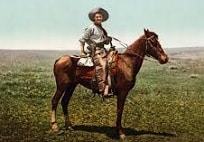 The term gringo is used in Spanish-speaking countries to refer to an individual who speaks a different language . Generally the concept is used with respect to those who communicate in English .
The term gringo is used in Spanish-speaking countries to refer to an individual who speaks a different language . Generally the concept is used with respect to those who communicate in English .
For example: “Last night a gringo came to the bar and spent a lot of time drinking beer” , “I don't understand what that gringo is saying” , “Gringos are very friendly and always show interest in our culture” .
The use of the notion is quite broad and may vary according to the region or context. In some countries , an American , British or Russian is called a gringo. In certain nations, the adjective is even applied to an individual with white skin and blonde hair .
In Uruguay and Argentina , gringos are those European immigrants who arrived in the American continent in the 19th and 20th centuries and also their descendants. Sometimes, someone who lives in the countryside is called a gringo: “This town was founded by the gringos who developed the first crops,” “Last night I ate a barbecue that a gringo made; “It was an unforgettable dinner,” “My grandfather is a gringo who worked all his life.”
Another meaning of the word is associated with foreigners in general, in this case in a derogatory sense : “We should not allow gringos to tell us what to do” , “This city is full of gringos” , “They should control better the borders and not allowing the entry of gringos who come to commit crimes.”
The etymology of the word gringo is very interesting and broad, with different versions depending on the region. It is important to establish a basis: the fundamental meaning refers to someone who speaks a language "impossible to understand" for the observer. This has certain implicit connotations about the latter's level of education , since even among his compatriots there will be those who can understand and speak the "gringo" language, which is why they do not call him that way.
 There are some scholars who claim that the term gringo arose after deforming Greek . Apparently, this linguistic phenomenon took place in Spain and later the new concept reached Latin American countries. One of the most striking aspects of its meaning is the contempt - sometimes implicit but other times explicit - for foreign people. What leads a human being to develop negative feelings towards those who come from another country? Is it the fear of the unknown? Is it the discomfort of not understanding their languages? Is it the denial of one's desire to belong somewhere else?
There are some scholars who claim that the term gringo arose after deforming Greek . Apparently, this linguistic phenomenon took place in Spain and later the new concept reached Latin American countries. One of the most striking aspects of its meaning is the contempt - sometimes implicit but other times explicit - for foreign people. What leads a human being to develop negative feelings towards those who come from another country? Is it the fear of the unknown? Is it the discomfort of not understanding their languages? Is it the denial of one's desire to belong somewhere else?
The reason gringo is a deformation of Greek is that this language is not very popular among Spanish speakers, something that also happens with Chinese. In fact, there is the expression "basic Chinese" to denote any concept or speech that we consider very difficult or impossible to understand.
It is also said that this association between Greek and the impossible to understand has a much more remote origin, since it comes from the Latin expression graecum est; non legitur , that is , it is Greek, not to be read , widely used by Catholics to prevent the reading of texts in that language, with the justification that they had already been officially translated into Latin. As can be seen, the etymology of this term is truly vast, to the point that the Academy of Language itself considers it "discussed."
“Old Gringo” , on the other hand, is the title of a novel written by the Mexican Carlos Fuentes that was published in 1985 , inspired by the life of Ambrose Bierce . Four years later, “Old Gringo” had a film adaptation starring Gregory Peck and Jane Fonda .
